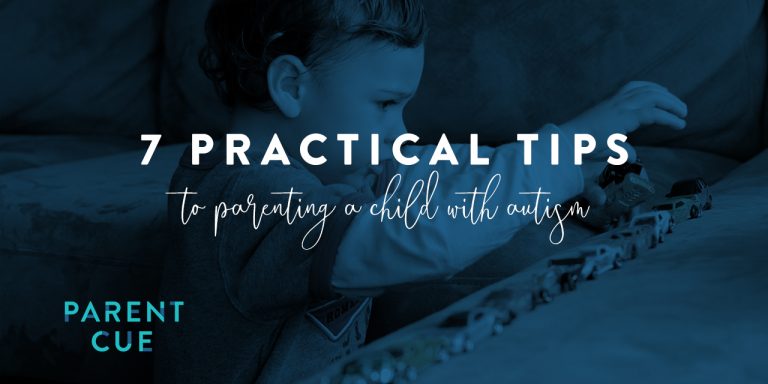
Finding out our son had autism was a major blow to the idealistic picture we held of what parenting might be like. Parenting, in general, is far from easy, but parenting a child with autism can be particularly demanding. In my last blog, I shared our journey about what extreme parenting sometimes feels like, and if you’re also a parent of a child with autism spectrum disorder (ASD), I want you to know you’re not alone. Even as an equipped mental health therapist, receiving that diagnosis was life-changing. Here are a few strategies that are helping our family to cope:
1. Reframe acting-out behaviors.
When Brayden was four, there was one particularly intense scene at the mall that necessitated a change of direction on my part. I wanted so badly to be able to do “normal activities” with my child. Although most four-year-old’s can handle a brief trip to the department store, Brayden could not. He, like many children with ASD, suffers from sensory integration challenges and became unglued within minutes of entering the building. became weary attempting to calm him. Rather than dwell in a place of frustration over the chaotic scene, I reminded myself that he wasn’t purposefully trying to frustrate me, but was simply responding to the overly stimulating environment. Every child has a different threshold for sensory overload, and each child develops new skills at different ages. My child wasn’t yet ready for that experience. Visiting smaller retail stores with less sensory stimuli proved to be a much more successful endeavor.
Related Post: Finding Out Your Child Has Autism
2. Use positive discipline.
For many children, positive feedback and encouragement can be a motivating and very effective form of discipline. The same is true for children on the spectrum. All too often, parents fall into the trap of monitoring and correcting behaviors without always acknowledging when their child is displaying positive actions. I get it. My husband and I decided that while we wanted to protect Brayden from harm and shield him from rejection, it was equally important for him to know how amazingly accomplished he is. Well-placed compliments and expressions of love went a long way in building his self-confidence and promoting constructive behaviors.
3. Celebrate quirks and talents.
Strengths typically represent your ASD child’s highest-functioning area. We now have a greater awareness of many famous and accomplished individuals in the arts and entertainment world who have ASD. Several of them areaward-winningg musicians and directors! Recognizing your child’s talents and reinforcing them is key. Rather than just attending to areas of deficit, focus on your child’s strengths. Bray loves music, numbers, and can put together a complex puzzle in record time. One helpful tip is to redirect repetitive play and interests into more socially acceptable behaviors. Who knows? That annoying quirk may be the one thing that transfers into the world of work, leading to a productive and fulfilling career.
4. Enhance peer relationships.
We’re all social beings and need continual interaction to develop. Depending on the stage of development, school offers children with ASD and their peers opportunities for building social networks and meaningful relationships. Having your child ride the bus or carpool with a classmate is a great start. Recess, which can be very difficult for children with ASD due to feelings of exclusion and loneliness, is an ideal time to have peers interact and support your child around shared interests. Remember, every relationship starts slowly, but even small interactions can be the beginning of a meaningful friendship.
5. Take advantage of resources.
A diagnosis of ASD, and its associated physical and mental health symptoms, can take a toll on family functioning and harmony. Forming connections with other parents who are raising children with ASD is critical for optimizing your own sense of well-being. An occasional encouraging text from an ASD mom helped me to feel less alone during high stress points. There are exciting new developments in behavioral therapies and social supports for ASD. Many non-profits are partnering with ASD advocacy groups to provide weekend and weeklong camps for the entire family as well as respite for parents. Myles-A-Part is a non-profit that sponsors a free weekend couple’s retreat that was a Godsend for my husband and I a few years ago. Additionally, books such as Raising Resilient Children with Autism Spectrum Disorders by Dr. Robert Brooks and Dr. Sam Goldstein are full of unique parenting tools and became a fixture on my nightstand.
6. Prioritize self-care.
As parents, patience exits quickly when we’re stressed and overwhelmed. Most ASD kids are sensitive to their parents’ anxieties, which intensifies their own reactions. Keeping calm during meltdowns and practicing mindfulness helped me to develop self-compassion during high stress periods, rather than feeling defeated. Simple activities such as meeting friends for lunch, going to bed early, starting a new novel, or my husband volunteering to take the kids out for some time so that I can have a break does wonders for pushing that reset button!
7. Accept your child for who they are.
The first step in acceptance is acknowledging the difficulties in parenting a child with ASD. Acceptance applies to both ourselves as parents and to our kids. Yes, parenting was very challenging, particularly during the early years. However, we worked toward reducing judgment toward ourselves or toward our son and, instead, cultivating compassion. Indeed, life would be much easier without autism in it, but this IS our life. Finding ways to help our child, and ourselves, to adjust to our new normal was beneficial.
Related Post: Finding Peace Through Autism
If your burdens feel too much to bear right now and acceptance feels too far away, please be encouraged because there is hope! As a working mom of two little ones, ages six and two, I oftentimes find myself quite weary. There are times when I don’t feel as if I’m giving enough to my career, my husband or my kids . . . and that is difficult for me. A big part of experiencing peace in our parenting came when the Lord showed us that we’d done all He’d asked for now. We weren’t to “fix” our son; that was His job. We were to be a part of his journey and show him God’s perfect love as best as we could.
Source: The Parent Cue




